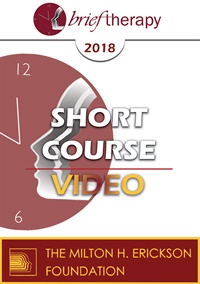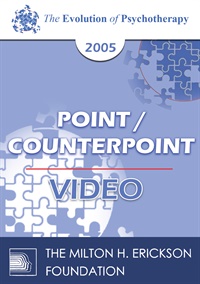- Average Rating:
- Not yet rated
- Topic Areas:
- Clinical Demonstrations | Personality Disorders | Brief Therapy | Cognitive Behavior Therapy (CBT) | Therapist Development | Treatment Planning
- Categories:
- Brief Therapy Conference | Brief Therapy Conference 2002
- Faculty:
- Arthur Freeman, EdD
- Course Levels:
- Master Degree or Higher in Health-Related Field
- Duration:
- 59:05
- Format:
- Audio and Video
- Original Program Date:
- Dec 13, 2002
- Short Description:
- Educational Objectives: 1) To describe a structured, directive CBT interview. 2) Given a CBT case, identify a problem and make a treatment plan.
- Price:
-
Sale is $29.00
price reduced from Base Price - $59.00
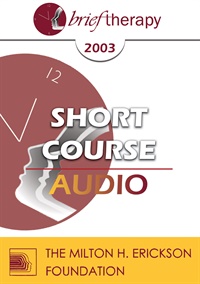
- Average Rating:
- Not yet rated
- Topic Areas:
- Short Courses | Addiction | Brief Therapy | Psychotherapy | Abuse | Motivation | Personality Disorders
- Categories:
- Brief Therapy Conference | Brief Therapy Conference 2003
- Faculty:
- Ralph Armstrong, MD
- Duration:
- 1:37:13
- Format:
- Audio Only
- Original Program Date:
- Dec 13, 2003
- Short Description:
- Motivation is crucial to successful recovery from Substance Use Disorders. Fifteen DSM IV conditions reduce the motivation needed to bond with programs that assist in abstinence. Child abuse and neglect are frequent in substance abusers, and a conceptualization of its role in substance abuse is given. Therapy for sequelae such as schizoid personality, resentment, pessimism and others are described. with treatment of Axis I and II disorders accomplished, and the effects of abuse/neglect allayed, involvement with 12 step programs is more likely.
- Price:
- $15.00 - Base Price
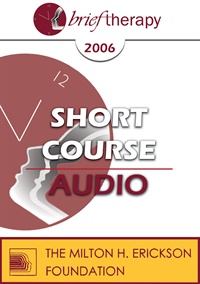
- Average Rating:
- Not yet rated
- Topic Areas:
- Short Courses | Brief Therapy | Obsessive Compulsive Disorder (OCD) | Personality Disorders | Passive-Aggressiveness | Therapeutic Relationship
- Categories:
- Brief Therapy Conference | Brief Therapy Conference 2006
- Faculty:
- Vann Joines, PhD
- Duration:
- 1:18:47
- Format:
- Audio Only
- Original Program Date:
- Dec 07, 2006
- Short Description:
- There are six core personality adaptations that form the basic building blocks of personality. These are schizoid, paranoid, antisocial, passive-aggressive, obsessive-compulsive and histrionic. Each of these has a specific way (feeling, thinking, or behavior) of making contact with the world, a target area for growth and change, and a trap area where the person has the greatest defenses. By knowing this information, the therapist can quickly establish rapport, target interventions to the area that will produce the greatest change, and avoid getting trapped in the client's defenses. This workshop will look at these six core adaptations, how they develop, and how to work most effectively with each one.
- Price:
- $15.00 - Base Price
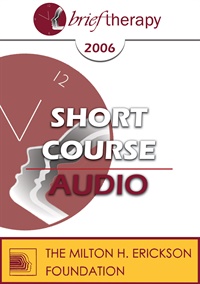
- Average Rating:
- Not yet rated
- Topic Areas:
- Short Courses | Borderline | Brief Therapy | Personality Disorders
- Categories:
- Brief Therapy Conference | Brief Therapy Conference 2006
- Faculty:
- Michael Munion, MA, LPC
- Duration:
- 1:18:42
- Format:
- Audio Only
- Original Program Date:
- Dec 07, 2006
- Short Description:
- This course examines the nature of Borderline Personality Disorder (BPD), and presents an integrated model of treatment of specific issues in brief, solution-focused episodes. Core elements of a safety plan and development of a community resource network are described. Careful management of the therapeutic relationship is a critical part of this approach. Some specific protocols for common BPD issues, such as suicidal ideation and self-injurious behaviors are elaborated.
- Price:
- $15.00 - Base Price
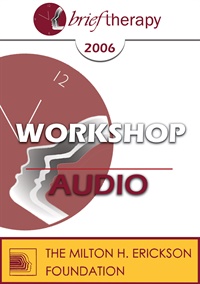
- Average Rating:
- Not yet rated
- Topic Areas:
- Workshops | Cognitive Behavior Therapy (CBT) | Personality Disorders | Brief Therapy | Therapeutic Relationship
- Categories:
- Brief Therapy Conference | Brief Therapy Conference 2006
- Faculty:
- Judith Beck, PhD
- Duration:
- 2:38:42
- Format:
- Audio Only
- Original Program Date:
- Dec 07, 2006
- Short Description:
- Learn how to apply cognitive therapy with clients who have personality disorders and complex relational patterns. Participants see how structure, empathy, and clear boundaries work together when strong emotions, alliance ruptures, and safety issues arise in session. The presentation walks through core strategies such as collaborative problem solving, Socratic questioning, role play, and use of feedback, showing how cognitive therapy stays flexible, humane, and effective with high-conflict or high-risk cases.
- Price:
- $15.00 - Base Price
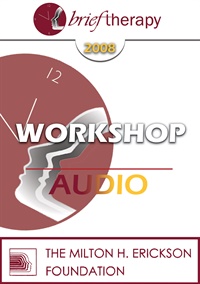
- Average Rating:
- Not yet rated
- Topic Areas:
- Workshops | Borderline | Brief Therapy | Personality Disorders | Solution Oriented Approach
- Categories:
- Brief Therapy Conference | Brief Therapy Conference 2008
- Faculty:
- Michael Munion, MA, LPC
- Duration:
- 2:28:27
- Format:
- Audio Only
- Original Program Date:
- Dec 11, 2008
- Short Description:
- This workshop examines the nature of Borderline Personality Disorder (BPD), and presents an integrated model of treatment of specific issues in brief, solution-focused episodes. Core elements of a safety plan and development of a community resource network are described. Careful management of the therapeutic relationship is a critical part of this approach. Some specific protocols for common BPD issues, such as suicidal ideation and self-injurious behaviors are elaborated.
- Price:
- $15.00 - Base Price
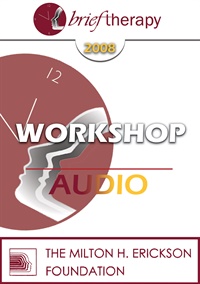
- Average Rating:
- Not yet rated
- Topic Areas:
- Workshops | Borderline | Brief Therapy | Personality Disorders
- Categories:
- Brief Therapy Conference | Brief Therapy Conference 2008
- Faculty:
- James Prochaska, PhD
- Duration:
- 2:41:36
- Format:
- Audio Only
- Original Program Date:
- Dec 12, 2008
- Short Description:
- Overcoming Chronic Problems involves progress through six stages of change: pre-contemplation, contemplation, preparation, action, maintenance and termination. Therapeutic principles and processes need to be matched to each stage of change. Innovative interventions for applying these principles and processes will be presented along with evidence and examples of how stage-matched therapy can outperform brief action-oriented therapies.
- Price:
- $15.00 - Base Price
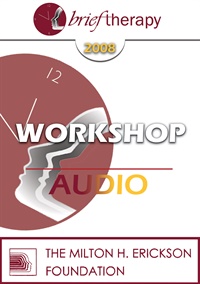
- Average Rating:
- Not yet rated
- Topic Areas:
- Workshops | Brief Therapy | Personality Disorders | Therapist Development
- Categories:
- Brief Therapy Conference | Brief Therapy Conference 2008
- Faculty:
- Claudio Naranjo, MD
- Duration:
- 2:31:27
- Format:
- Audio Only
- Original Program Date:
- Dec 14, 2008
- Short Description:
- This workshop is a succinct review of the neurotic needs and fixed dysfunctional ideas of 27 personality structures in Ichazo's proto-analysis, Illustrated through film excerpts and comments from participants.
- Price:
- $15.00 - Base Price
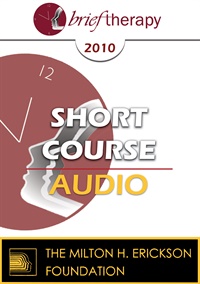
- Average Rating:
- Not yet rated
- Topic Areas:
- Short Courses | Autism | Brief Therapy | Children and Adolescent Therapy | Personality Disorders
- Categories:
- Brief Therapy Conference | Brief Therapy Conference 2010
- Faculty:
- Sherri Reynolds
- Duration:
- 1:20:40
- Format:
- Audio Only
- Original Program Date:
- Dec 09, 2010
- Short Description:
- Participants will learn greater depth of knowledge around diagnosis of autism through infancy and childhood, including differential diagnosis. Participants will also be taught about the various treatment modalities. All functioning levels will be discussed. Most importantly, participants will be taught strategic interventions to address specific core issues in clients with autism. Participants will learn safety and tantrum protocols to help with aggressive or severe tantrums. With Sheri Reynolds.
- Price:
- $15.00 - Base Price
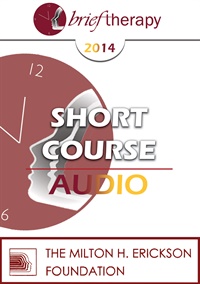
- Average Rating:
- Not yet rated
- Topic Areas:
- Short Courses | Borderline | Brief Therapy | Personality Disorders
- Categories:
- Brief Therapy Conference | Brief Therapy Conference 2014
- Faculty:
- Michael Munion, MA, LPC
- Duration:
- 1:30:14
- Format:
- Audio Only
- Original Program Date:
- Dec 11, 2014
- Short Description:
- This course examines the nature of Borderline Personality Disorder (BPD), and presents an integrated model for treatment of specific issues in brief, solution-focused episodes. Core elements of a safety plan and development of a community resource network are described. Careful management of the therapeutic relationship is a critical part of this approach. Some specific protocols for common BPD issues, such as suicidal ideation and self-injurious behaviors are elaborated.
- Price:
- $15.00 - Base Price
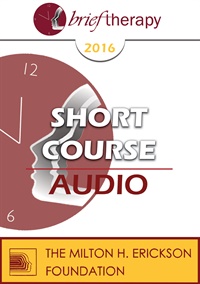
- Average Rating:
- Not yet rated
- Topic Areas:
- Short Courses | Bipolar | Utilization | Brief Therapy | Personality Disorders
- Categories:
- Brief Therapy Conference | Brief Therapy Conference 2016
- Faculty:
- Suzanne Black, PsyD
- Duration:
- 1:30:51
- Format:
- Audio Only
- Original Program Date:
- Dec 08, 2016
- Short Description:
- Bipolar disorder, especially type II, is often misdiagnosed, undertreated, and deeply stigmatized. In this candid and clinically rich session, Suzanne Black blends personal disclosure with decades of experience to explore nuanced assessment, differential diagnosis, mood tracking, psychotherapy strategies, and evolving biological research. She offers practical tools for working with mood instability while emphasizing therapeutic alliance, psychoeducation, and helping patients develop a livable narrative with, rather than against, the condition.
- Price:
- $15.00 - Base Price
Credit available - Click Here for more information
- Average Rating:
- Not yet rated
- Topic Areas:
- Short Courses | Borderline | Brief Therapy | Personality Disorders
- Categories:
- Brief Therapy Conference | Brief Therapy Conference 2018 | Online Continuing Education
- Faculty:
- Michael Munion, MA, LPC
- Course Levels:
- Master Degree or Higher in Health-Related Field
- Duration:
- 1:29:43
- Format:
- Audio and Video
- Original Program Date:
- Dec 06, 2018
- Short Description:
- Brief Treatment with the Borderline Personality Disorder (BPD) patient makes no pretense at wholesale personality reconstruction, but rather considers the impact of the disorder on the therapy process in order to enhance the probability of success in successive brief episodes of care. This workshop reviews the etiology of BPD from both the Object Relations and the Psycho-social viewpoints. Specific protocols for dealing with issues such as Self-injurious behavior and Suicidal Ideation are reviewed.
- Price:
-
Sale is $29.00
price reduced from Base Price - $59.00

- Average Rating:
- Not yet rated
- Topic Areas:
- Workshops | Couples Therapy | Personality Disorders | Psychobiological Approach to Couples Therapy (PACT) | Developmental Psychology
- Categories:
- Couples Conference | Couples Conference 2007 | Pioneers in Couples and Family Therapy
- Faculty:
- Stan Tatkin, PsyD, MFT
- Duration:
- 2:17:46
- Format:
- Audio Only
- Original Program Date:
- Apr 27, 2007
- Short Description:
- A developmental-psychobiological approach to treating challenging couples, focusing on real-time regulation, attachment patterns, and nervous system dynamics. Emphasizing mutual expertise, quick repair, and interactive regulation, the model shifts from content-based conflict to addressing core relational deficits. Techniques include joint sessions, humor, video playback, and brief interventions for sustained progress.
- Price:
- $15.00 - Base Price

- Average Rating:
- Not yet rated
- Topic Areas:
- Workshops | Addiction | Attachment | Couples Therapy | Personality Disorders | Avoidant | Psychobiological Approach to Couples Therapy (PACT)
- Categories:
- Couples Conference | Couples Conference 2008 | Pioneers in Couples and Family Therapy
- Faculty:
- Stan Tatkin, PsyD, MFT
- Duration:
- 2:24:28
- Format:
- Audio Only
- Original Program Date:
- Apr 27, 2008
- Short Description:
- Avoidant attachment can resemble disorders of the self, such as narcissistic or schizoid presentations, where partners rely heavily on auto-regulation and disengage from mutual emotional attunement. This workshop examines how such dynamics play out in romantic relationships, offering practical strategies—like proximity-based interventions and structured dyadic exercises—to support co-regulation and foster secure relating.
- Price:
- $15.00 - Base Price

- Average Rating:
- Not yet rated
- Topic Areas:
- Workshops | Personality Disorders | Couples Therapy
- Categories:
- Couples Conference | Couples Conference 2018 | Pioneers in Couples and Family Therapy
- Faculty:
- Stan Tatkin, PsyD, MFT
- Duration:
- 2:03:49
- Format:
- Audio Only
- Original Program Date:
- May 06, 2018
- Short Description:
- This workshop reframes couple therapy for personality-disordered partners through a psychobiological, polytheoretical lens. Focusing on borderline, narcissistic, and schizoid presentations, it equips clinicians to differentiate these from insecure or neurotic traits and intervene without over-individualizing. Practical tools help therapists manage complex defenses, sustain neutrality, and maintain a strong therapeutic frame in high-stakes relational systems.
- Price:
- $15.00 - Base Price

Credit available - Click Here for more information
- Average Rating:
- Not yet rated
- Topic Areas:
- Workshops | Psychobiological Approach to Couples Therapy (PACT) | Personality Disorders | Continuing Education | Couples Therapy
- Bundle(s):
- CC19 Main Conference Audio Bundle | CC19 Individual Selections
- Categories:
- Couples Conference | Couples Conference 2019 | Online Continuing Education | Pioneers in Couples and Family Therapy
- Faculty:
- Stan Tatkin, PsyD, MFT
- Duration:
- 3:06:45
- Format:
- Audio Only
- Original Program Date:
- Apr 14, 2019
- Short Description:
- This advanced PACT workshop explores how to work effectively with personality-disordered partners, distinguishing structural deficits from insecure attachment. Drawing from object relations and ego psychology, it examines disorders like borderline and narcissistic personality, emphasizing projective identification, betrayal, and power dynamics. Techniques focus on fostering secure functioning while navigating trauma, trust ruptures, and cultural influences within couple systems.
- Price:
- $15.00 - Base Price
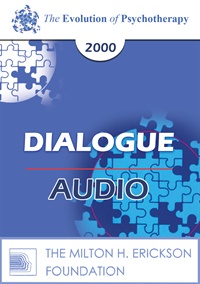
- Average Rating:
- Not yet rated
- Topic Areas:
- Psychotherapy | Dialogues | Personality Disorders
- Categories:
- Evolution of Psychotherapy | Evolution of Psychotherapy 2000
- Faculty:
- Otto Kernberg, MD | James F. Masterson, MD
- Duration:
- 55 Minutes
- Format:
- Audio Only
- Original Program Date:
- May 27, 2000
- Short Description:
- EP00 Dialogue 04 - Personality Disorders - Otto Kernberg, M.D., and James Masterson, M.D. Given a topic, to become aware of the differing approaches to psychotherapy, and to identify the strengths and weaknesses in each approach. Moderated by Michael Yapko, Ph.D.
- Price:
- $15.00 - Base Price

- Average Rating:
- Not yet rated
- Topic Areas:
- Psychotherapy | Invited Addresses | Narcissism | Personality Disorders | Psychoanalysis | Object Relations Theory
- Categories:
- Evolution of Psychotherapy | Evolution of Psychotherapy 2000
- Faculty:
- James F. Masterson, MD | James Hillman, PhD
- Duration:
- 1 Hour 19 Minutes
- Format:
- Audio Only
- Original Program Date:
- May 29, 2000
- Short Description:
- In this paper, Dr. Masterson gives an understanding of the intrapsychic structure of Narcissistic Personality Disorder and how it finds clinical expression through the disorders of the self triad. Clinical cases are presented to illustrate how the therapeutic intervention of mirroring interpretation of narcissistic vulnerability helps the patient to convert transference acting-out to therapeutic alliance and transference, thereby creating the condition for psychoanalytic psychotherapy.
- Price:
- $15.00 - Base Price
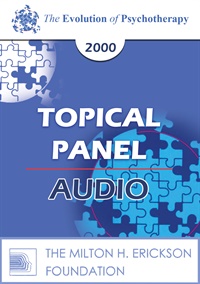
- Average Rating:
- Not yet rated
- Topic Areas:
- Topical Panels | Schizophrenia | Personality Disorders | Psychotherapy
- Categories:
- Evolution of Psychotherapy | Evolution of Psychotherapy 2000 | Pioneers in Couples and Family Therapy
- Faculty:
- Ray Corsini, PhD | Jay Haley, MA | Otto Kernberg, MD | Michael White, B.A.S.W.
- Duration:
- 53 Minutes
- Format:
- Audio Only
- Original Program Date:
- May 28, 2000
- Short Description:
- The panel presents approaches to treating schizophrenia with an emphasis on personalized care, collaboration with medication, and the use of psychotherapy. Techniques are discussed like revoicing auditory hallucinations aim to reduce vulnerability to psychotic episodes. Recovery data and the importance of psychosocial support and family involvement are also highlighted. Moderated by Ruth McClendon, MSW.
- Price:
- $15.00 - Base Price
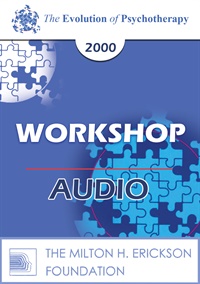
- Average Rating:
- Not yet rated
- Topic Areas:
- Cognitive Behavior Therapy (CBT) | Workshops | Personality Disorders | Psychotherapy
- Categories:
- Evolution of Psychotherapy | Evolution of Psychotherapy 2000
- Faculty:
- Judith Beck, PhD | Aaron Beck, MD
- Duration:
- 2 Hours 40 Minutes
- Format:
- Audio Only
- Original Program Date:
- May 25, 2000
- Short Description:
- Cognitive therapy can be adapted for people with severe and persistent mental disorders, including psychosis, chronic depression, and complex comorbidity. Participants in this workshop learn how therapists work collaboratively with delusions, hallucinations, and entrenched beliefs without confrontation, while building hope, structure, and day-to-day coping skills. The session offers a grounded view of cognitive therapy as flexible, humane, and practical, showing how careful formulation and relationship make meaningful change possible even in high-severity cases.
- Price:
- $15.00 - Base Price
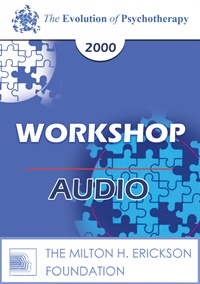
- Average Rating:
- Not yet rated
- Topic Areas:
- Workshops | Narcissism | Personality Disorders | Psychoanalysis | Object Relations Theory | Psychotherapy | Supervision
- Categories:
- Evolution of Psychotherapy | Evolution of Psychotherapy 2000
- Faculty:
- James F. Masterson, MD
- Duration:
- 1 Hour 10 Minutes
- Format:
- Audio Only
- Original Program Date:
- May 25, 2000
- Short Description:
- This workshop comprises three elements: A one-hour videotape demonstrating the use of mirroring interpretation of narcissistic vulnerability to establish a therapeutic alliance, discussion of the tape, and supervision of cases presented by the audience.
- Price:
- $15.00 - Base Price
- Average Rating:
- Not yet rated
- Topic Areas:
- Point/Counterpoint Sessions | Narcissism | Personality Disorders | Psychotherapy
- Categories:
- Evolution of Psychotherapy | Evolution of Psychotherapy 2005
- Faculty:
- Otto Kernberg, MD | James F. Masterson, MD
- Course Levels:
- Master Degree or Higher in Health-Related Field
- Duration:
- 1:18:56
- Format:
- Audio and Video
- Original Program Date:
- Dec 08, 2005
- Short Description:
- Indications and contraindications for supportive and psychodynamic approaches to pathological narcissism will be outlined. Essential techniques of these modalities for narcissistic patients will be described, and alternative approaches examined.
- Price:
-
Sale is $29.00
price reduced from Base Price - $59.00
- Average Rating:
- Not yet rated
- Topic Areas:
- Workshops | Personality Disorders | Psychoanalysis | Psychotherapy | Therapeutic Relationship | Transference / Countertransference
- Categories:
- Evolution of Psychotherapy | Evolution of Psychotherapy 2005
- Faculty:
- James F. Masterson, MD
- Course Levels:
- Master Degree or Higher in Health-Related Field
- Duration:
- 2:39:20
- Format:
- Audio and Video
- Original Program Date:
- Dec 07, 2005
- Short Description:
- The therapeutic alliance is described along with transference and transference acting-out. The therapeutic task is defined - i.e., to help the patient convert transference acting-out to therapeutic alliance and transference through appropriate interventions. The psychotherapy of each of the disorders (Borderline, Narcissistic and Schizoid) is described in terms of indications, therapeutic technique and goals. Clinical examples will be given. Two videotapes of psychotherapy will be presented- one with a Borderline patient and the other with a Narcissistic disorder. Countertransference problems are described.
- Price:
-
Sale is $29.00
price reduced from Base Price - $59.00
- Average Rating:
- Not yet rated
- Topic Areas:
- Workshops | Personality Disorders | Psychotherapy
- Categories:
- Evolution of Psychotherapy | Evolution of Psychotherapy 2005
- Faculty:
- Otto Kernberg, MD
- Course Levels:
- Master Degree or Higher in Health-Related Field
- Duration:
- 2:03:54
- Format:
- Audio and Video
- Original Program Date:
- Dec 11, 2005
- Short Description:
- EP05 Workshop 35 - Etiology, Psychotherapy. Diagnosis and Treatment Indicators for Severe Personality Disorders - Otto Kernberg, M.D. Present day knowledge and leading hypotheses regarding severe personality disorders will be reviewed, and their relationship to clinical characteristics of these patients clarified. A critical review of present classification will be followed by exploration of specific technical approaches to diagnostic interviewing and decision-making regarding specific therapeutic approaches to each patient.
- Price:
-
Sale is $29.00
price reduced from Base Price - $59.00

- Average Rating:
- Not yet rated
- Topic Areas:
- Clinical Demonstrations | Borderline | Interviewing | Personality Disorders | Psychotherapy
- Categories:
- Evolution of Psychotherapy | Evolution of Psychotherapy 2009
- Faculty:
- Otto Kernberg, MD
- Duration:
- 52 Minutes
- Format:
- Audio Only
- Original Program Date:
- Dec 12, 2009
- Short Description:
- Educational Objectives: Given a patient, give an example of a structural interview. To describe how to test reality testing.
- Price:
- $15.00 - Base Price



